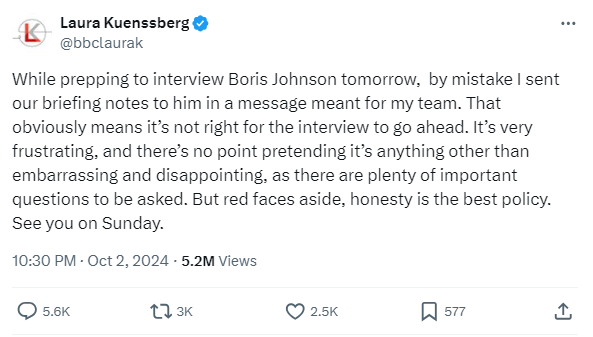As you may have spotted in this week’s news, the BBC cancelled their upcoming interview with Boris Johnson after Laura Kuenssberg accidently shared her briefing notes with him in an email ahead of their meeting this Friday.
While this has caused “red faces” and a lot of media headlines, it got us talking around the practice of sharing interview questions with candidates prior to job interviews.
Obviously, a different situation but it’s one we are asked about as recruiters and so we thought we’d take the opportunity to look at the merits and drawbacks of this sometimes-contentious topic.
What are potential benefits of pre-sharing job interview questions
Transparency and Fairness: Sharing questions beforehand can allow candidates to prepare more effectively and ensure they're well-equipped to answer your questions.
Improved Candidate Experience: By providing candidates with a glimpse of what to expect, you can enhance their overall interview experience. This can positively impact your employer brand and attract top talent.
Focus on Skills and Qualifications: When candidates know the questions in advance, the interview can become less about memorising a bank of standard answers and more about showcasing their skills and qualifications in a meaningful way.
Reduced Anxiety: Knowing the questions in advance can alleviate anxiety for candidates who may experience interview jitters. This can lead to more confident and effective interviews.
Standardised Evaluation: Pre-sharing questions can ensure that all candidates are evaluated on the same criteria, promoting fairness and consistency in the hiring process.
What are the potential drawbacks of pre-sharing job interview questions
Lack of Spontaneity: When candidates have time to prepare, it can limit their ability to demonstrate spontaneity and adaptability, which are essential qualities in many roles.
Lack of Authenticity: Pre-sharing questions can make interviews feel more scripted and less authentic, making it difficult to assess a candidate's true personality and fit for the role.
Potential for Gaming the System: Candidates may attempt to memorise answers or seek help from others, including AI, undermining the purpose of the interview.
Increased Workload: Pre-sharing questions may require additional time and effort from recruiters/hirers to develop and distribute them as well as factoring in whether candidates have the same amount of time ahead of their individual interviews?
As you can see, when considering whether to pre-share interview questions with candidates, it's important to weigh the potential benefits and drawbacks carefully. Here are some additional factors we would recommend you consider:
What should you consider when deciding to pre-share interview questions
Type and Focus of Question: Questions that require candidates to share personal experiences or examples from their own work history are less likely to be “gamed” or memorised.
Level of Experience: For entry-level candidates or those with limited experience in the field, pre-sharing questions could help provide a level playing field and help them to demonstrate their potential.
Company Culture: If your organisation emphasises transparency and fairness, pre-sharing questions may align with these principles and help establish those values and the culture of your organisation with your candidates.
Interview Format: Pre-sharing questions for initial interview stages can help candidates prepare more effectively and reduce time for recruiters/hirers whilst knowing you are able to delve more deeply into key areas at later stages.
Candidate Preferences: It's also worth considering the preferences of the candidates themselves. Some candidates may appreciate the opportunity to prepare in advance, while others may prefer a more spontaneous interview.
If you are looking for advice on your interview structure or any other aspect of your recruitment process, get in touch with our recruitment team here at Escape, we’d be happy to help.
01506 461445